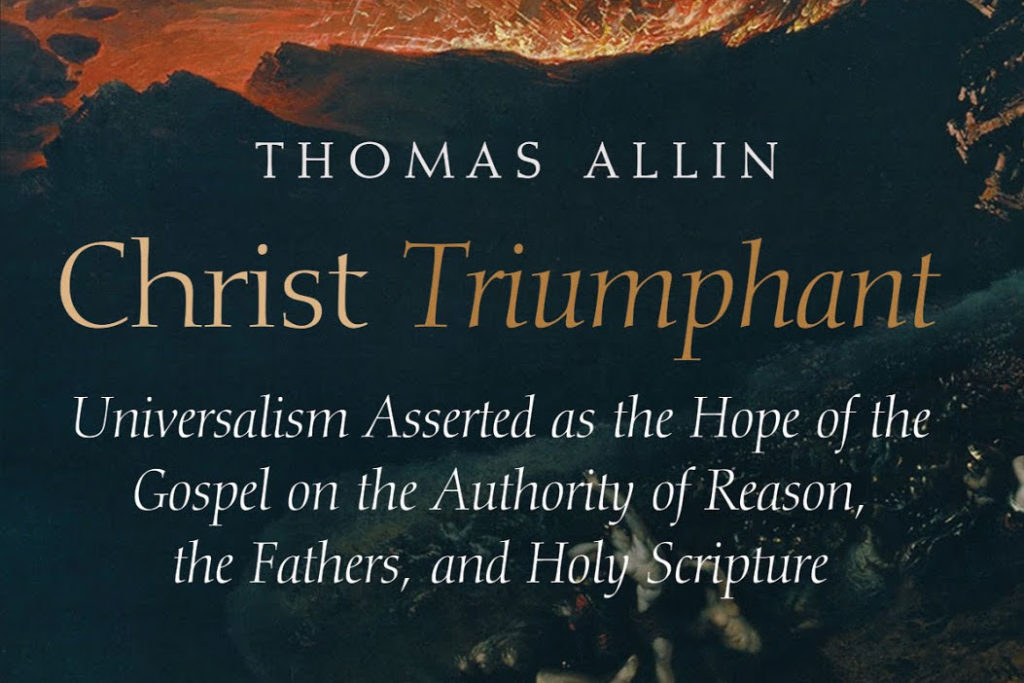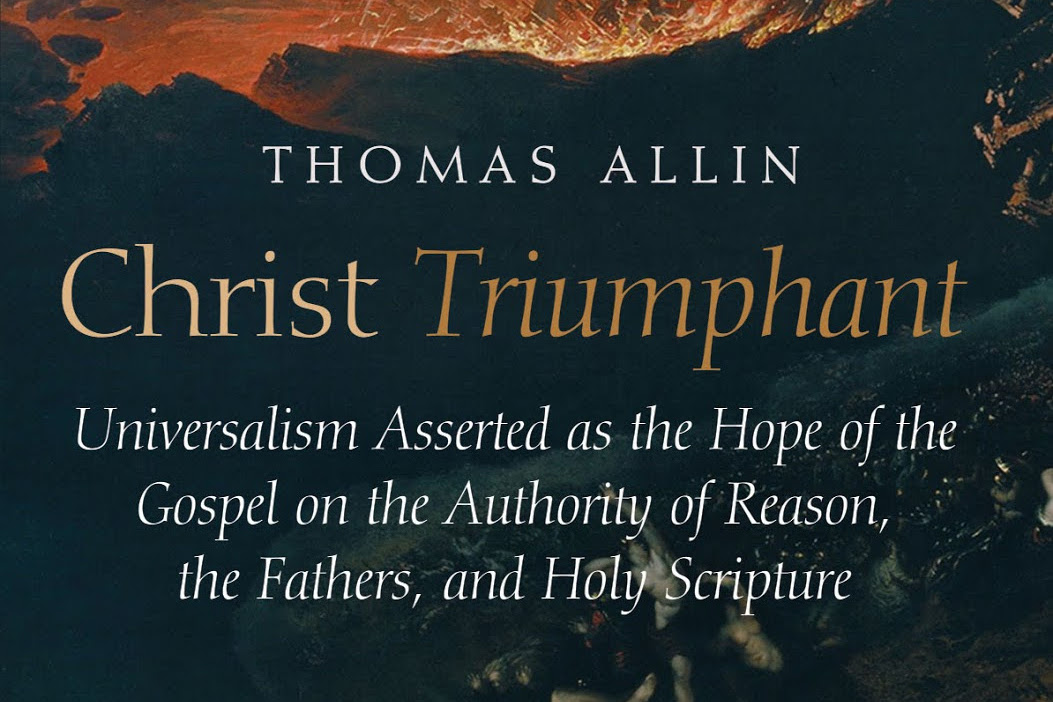
From Thomas Allin’s Christ Triumphant:
“I submit that the entire history of exegesis contains no stranger fact than [the] persistent ignoring of [a large] part of the New Testament. To bring this out clearly, I append the following chain of passages from a long series. They, clearly and closely linked, claim for Christ a saving empire coextensive with the race, or (perhaps) rather with the whole universe. This connection is clearly marked, for each passage suggests or contains the same central idea, and thus forms a link in a continuous chain.This chain begins at creation, when all things were created by Christ, who therefore, as St. Paul implies, reconciles (re-creates) all things unto God (Col 1: 16–20). Hence, his work is the restitution of all things (Acts 3: 21). He is Heir of all things (Heb 1: 2). The Father has given him authority over all flesh, to give to whosoever was given to him eternal life (John 17: 2, see original). So all flesh shall see the salvation of God (Luke 3: 6). For God—whose counsel is immutable (Heb 6: 17,18), whose attitude towards his enemies is love unchanging (Luke 6: 27–35)—will have all men to be saved (1 Tim 2: 4) and all to come to repentance (2 Pet 3: 9). He has shut all up unto unbelief, so that he may show mercy upon all (Rom 11: 32). For (out) of him, as Source, and unto (or into) him, as End, are all things whatsoever (Rom 11: 36). He has, therefore, put all things in subjection under Christ’s feet (Eph 1: 22). So we are assured that God wills to gather into one all things in Christ (Eph 1: 10). His grace comes upon all men unto justification of life (Rom 5: 18). So Jesus, knowing that the Father had given all things into his hands (John 13: 3), promises by his cross to draw all men unto himself (John 12: 32). For having, as stated, received all things from the Father (John 3: 35), all that was given comes to him, and he loses none (John 6: 37–39), but if any stray, goes after that which is lost till he finds it (Luke 15: 4), and so makes all things new (Rev 21: 5). Thus, he comes in order that all men may believe (John 1: 7); that the world through him may be saved (John 3: 17). His grace brings salvation to all men (Titus 2: 11). He takes away the sin of the world (John 1: 29). He gives his flesh for its life (John 6: 51). Because the gifts and calling of God are irrevocable (Rom 11: 29), he gives life to the world (John 6: 33). He is the light of the world (John 8: 12). He is the propitiation for the sins of the whole world (1 John 2: 2). He is the Saviour of all men (1 Tim 4: 10). He destroys the works of the devil, not some of them only (1 John 3:8), and the devil himself (Heb 2: 14). He abolishes death (2 Tim 1: 10). He is manifested to put away sin (Heb 9: 26), and thus subdues all things unto himself (Phil 3: 21—the context clearly shows this subjugation to be conformity to himself). He does not forget the dead, but takes the gospel to Hades (1 Pet 3: 19), of which he holds the keys (Rev 1: 18). He is the same (Saviour) for ever (Heb 13:8). Thus, even the dead are evangelized (1 Pet 4: 6), and death and Hades destroyed (Rev 20: 14). All are therefore made alive in him (1 Cor 15: 22). Christ finishes, completes his work (John 17: 4), restores all things (Acts 3: 21), and there is no more curse (Rev 22: 2, 3). Every knee of things in heaven and earth, and under the earth, bends to him (Phil 2: 10). The creation is delivered from the bondage of corruption (Rom 8: 21), and every creature joins in the song of praise (Rev 5: 13). So comes the end, when he delivers up the kingdom to God, who is then all in all (1 Cor 15: 24–28).These passages are, I repeat, not taken at random and piled up any way. They are the expression of that Purpose that runs though the Bible. It is a Purpose first stated in man’s creation in God’s image; a Purpose to be traced in the Law, the Psalms and Prophets; and most clearly in the New Testament. From it we learn that (I.) Christ came, claiming as His own the entire human race, to the end that He might save and restore the WHOLE, and not any fraction of it, however large. (II.) He came with full power “over all flesh”, having received power in heaven and on earth – over all hearts, all evil, all wills. (III.) He lived and died, and rose again, victorious in the fullest sense, “having finished His work,” as He expressly claims. ”
